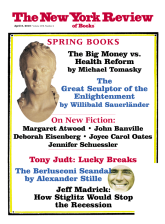In response to:
The Green Line from the February 25, 2010 issue
To the Editors:
Tony Judt’s memoirs are so beautifully written, insightful, and generally instructive that readers may not notice a serious historical distortion in one of them. When, in “Revolutionaries” [NYR, February 25], he mocks the idea that in May 1968 “a community of students…seriously intended to overthrow President Charles de Gaulle and his Fifth Republic,” he neglects to say that from mid-May to early June, most of France was on strike—not just students. The country was paralyzed for three weeks. A general strike is revolutionary by its very nature. That there was finally no revolution does not mean, as Raymond Aron famously said, that “nothing happened in May ’68.” I regret that Tony Judt, who has written such fine books about contemporary France, is now “disposed to share his contempt.”
David Ball
Professor Emeritus of French and Comparative Literature
Smith College
Northampton, Massachusetts
To the Editors:
Thank you for bringing us Tony Judt’s insightful and moving political and personal memoirs—certainly essential additions to his distinguished contributions to the historical and political understanding of our times. However, his recent memoir [“Revolutionaries,” NYR, February 25] self-accusingly (on behalf of all student revolutionaries of the 1960s) pleads ignorance of what was going on in Prague (1968) and in Poland (in the 1960s and 1970s). This is surely revisionist history. Paris was exciting to the anti-Stalinist New Left as part of a movement that embraced the uprisings in Prague and Warsaw (and the Gdansk/ Szczecin shipyards) and, for that matter, Hungary 1956.
Look back at, for example, the wide distribution of Jacek Kuron´ and Karol Modzelewski’s “Open Letter to the Party” of 1965; Hans-Jurgen Krahl, “Czechoslovakia: The Dialectic of the ‘Reforms,'” New Left Review, January–February 1969; or “Polish Workers and Party Leaders—A Confrontation” (transcript of meeting in Szczecin shipyard, January 23, 1971), New Left Review, March–April 1972.
While we had many faults that contributed to our defeat, some of them described in Judt’s memoir with great humor and chagrin, ignorance of history was not prominent among them, particularly when compared to the amnesiac politics of today.
Dan Smith
Seattle, Washington
Tony Judt replies:
I am sorry Professor Ball thinks I “distorted” history in my account of Paris in May 1968. He is right to remind readers that there was a nationwide strike going on during those same weeks. To a generation suffused with images of the Popular Front of 1936, the last time the French workforce struck on such a scale, this was a matter of great symbolic importance.
But a general strike is not axiomatically “revolutionary,” notwithstanding syndicalist fantasies of earlier days. I hate to sound like Lenin, but it needs leadership. The strikes and sit-ins of 1968 were remarkable for their spontaneity—but for just this reason they lacked any coherent strategy or goals. The only plausible leadership for a mass uprising was the French Communist Party (PCF): but it was—as the students rightly claimed—cynically uninterested in mobilizing the masses for radical change of any sort. The PCF just wanted to control popular discontent and channel it.
The French state was not remotely challenged in those years, though it is true that Charles de Gaulle sought reassurance from the army that it could be counted on to put down a revolt. A few years later, my Maoist contemporaries did try to “go to the workers”; but by then the workers—who had benefited from improved wages and conditions as part of the 1968 settlement—were not in the least interested. Only a tiny handful of former student “insurgents” moved in this direction—one of them, Pierre Overney, losing his life in front of a Renault factory in 1972.
As to “revisionist history”: Dan Smith asserts that Western radicals were thoroughly engaged with developments behind the iron curtain. This may have been true for the editors of the New Left Review, but I can assure him that—then as now—the NLR does not speak for anyone except itself. Revealingly, the magazine was obsessed in those years with the charms of workers’ control in Yugoslavia and the dialectical athleticism of the Belgrade “Praxis” group—some of whom would later resurface as intellectual fig leafs for Milo evic´. But that was about the limit of its empathy or concern with the Eastern bloc.
The Kuron´-Modzelewski Open Letter of 1965 allowed certain Western progressives to dream a dream of socialist reform in the Soviet bloc: there were still some good Marxists over there. But most left-leaning commentators in the West had long since moved on: not only were they not interested in official communism, but they had little time for its domestic opponents—prosaic and uninspiring when compared to third-world models then in vogue.
The idea that everyone in London, Paris, or Rome was “excited” by developments in the East is ludicrous—at best a retroactive projection of later sympathies. Again and again in those years, one encountered the claim that the dissidents and critics in Warsaw or Prague or Budapest were deluded liberals. They just “didn’t get it.” Ours was indeed a politicized generation, and much better informed in certain respects than its successors. But no one was anticipating 1989, and many on the Western left would have been sorry to learn that it was on the way. It is rather discomforting to recall how indifferent we were to developments within the Soviet zone. All the same, we really should not tell ourselves stories.
This Issue
April 8, 2010



